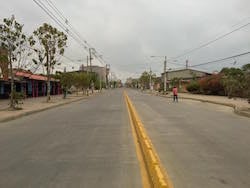Colombia criminal organization the Gaitanistas’ recently decreed 24-hour strike emptied streets and nearly paralyzed daily activities in the group’s areas of influence, suggesting a deep social penetration and perhaps a desire to be included in ongoing peace processes.
A pamphlet dated March 29 and signed by the “Estado Mayor” (General Staff) of the Autodefensas Gaitanistas de Colombia (AGC), also known the Gulf Clan, Urabeños, and Gaitanistas, called for the suspension of “all type of economic, work, or academic activity” from midnight March 31 until midnight April 1, reported Pacifista.
The pamphlet (seen below) circulated in several departments along Colombia’s Caribbean coast, including Antioquia, Chocó, Córdoba, Cesar, and Bolívar. The stated reason for the strike was to commemorate the death of a former AGC member, José Morelo Peñate, alias “Negro Sarley,” killed in April 2013 during a police operation.

On March 31, Semana reports life in areas of the Urabá region — the AGC’s stronghold — came to a standstill, with public transportation shutting down, businesses closing, and residents staying indoors.
One police officer and an army captain were killed during the strike. Their deaths are presumed to be part of the AGC “Plan Pistola,” which offers money to anyone that kills a police officer.
According to El Espectador, at least six police officers have been killed in their area’s of influence since the AGC initiated Plan Pistola in response to the death of Jairo de Jesús Durango, alias “Guagua,” a top leader killed by security forces on March 23.
This is the second time the AGC have called a strike. The first occurred in 2012 in retaliation for the death of Juan de Dios Úsuga, alias “Giovanni,” and affected six departments, reported El Espectador.
InSight Crime Analysis
The complete halt of daily life in response to the AGC’s call for a strike speaks to the mental, if not physical, sway the group holds over communities in their zones of influence. It also demonstrates the AGC’s continued strength, despite being the target of an ongoing security operation that seeks to capture its leader, Dairo Antonio Úsuga David, alias “Otoniel.”
SEE ALSO:Urabeños News and Profile
Beyond demonstrating the group’s social penetration, however, the strike raises the question of what they hope to achieve.
The strike follows closely on the announcement that guerrillas of the National Liberation Army (Ejército de Liberación Nacional – ELN) and Colombian government have opened formal peace negotiations. Negotiations with the Revolutionary Armed Forces of Colombia (Fuerzas Armadas Revolucionarias de Colombia – FARC) are at an advanced stage.
Ariel Ávila, an investigator with Colombia’s Foundation for Peace and Reconciliation (Fundación Paz y Reconciliación), told El Espectador the AGC might be hoping “to get something out of the peace process with the FARC and now the ELN.”
SEE ALSO:Colombia News and Profiles
The AGC have previously expressed a desire to open a peace process for their demobilization. Their strike pamphlet conveyed support for Colombia’s ongoing peace negotiations and called for an end to armed conflict that included a “dignified exit” for AGC members.
The Colombian government, however, has so far given few public indications it intends to open talks with the outlaw group.
Nonetheless, for Diego Sierra, coordinator of the Observatory for Human Rights and Peace (Observatorio de Derechos Humanos y Paz) at Colombia’s Popular Training Institute (Instituto Popular de Capacitación) the AGC’s message to the government is clear: “Negotiate with us.”

